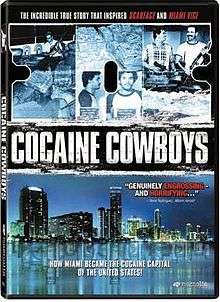Cocaine Cowboys
| Cocaine Cowboys | |
|---|---|
 | |
| Directed by | Billy Corben |
| Produced by |
Alfred Spellman Billy Corben David Cypkin |
| Starring |
Jon Roberts Mickey Munday Jorge "Rivi" Ayala |
| Music by | Jan Hammer |
| Cinematography | Armando Salas |
| Edited by |
Billy Corben David Cypkin |
| Distributed by | Magnolia Pictures |
Release dates |
US April 26, 2006 (Tribeca Film Festival) October 27, 2006 (limited) |
Running time | 116 minutes |
| Country | United States |
| Language | English |
Cocaine Cowboys is a 2006 documentary film directed by Billy Corben, and produced by Alfred Spellman and Billy Corben through their Miami-based media studio Rakontur. The film explores the rise of cocaine and the Miami Drug War (the resulting crime epidemic that swept the American city of Miami, Florida, in the 1970s and 1980s). The producers of Cocaine Cowboys use interviews with law enforcers, journalists, lawyers, former drug smugglers, and gang members to provide a first-hand perspective of the Miami drug war.
Synopsis
Cocaine Cowboys chronicles the development of the illegal drug trade in Miami during the 1970s and 1980s with interviews of both law enforcement and organized crime leaders, in addition to news footage from the era. The film reveals that in the 1960s and early 1970s, marijuana was the primary import drug into the region. During the 1970s, marijuana imports were replaced by the much more lucrative cocaine imports; as more cocaine was smuggled into the United States, the price dropped, allowing it to turn "blue collar" and become accessible to a wider market.
Drug importers reveal several of the different methods used to import the drug into Florida. The primary methods of transport were aircraft or boats. The drug importers also reveal the complexity of their importation methods. The logistics involved included the purchase and financing of legitimate businesses to provide cover for illegal operations, the use of sophisticated electronic homing devices, and other elaborate transportation schemes.
The film also addresses the difficulty importers sometimes had storing all the money they made, resulting in their setting up a relationship with Noriega in Panama, as well as buying up entire neighborhoods of houses, putting money into infrastructure, as well as investing in side projects, such as race horses.
The distribution networks were also highly elaborate, and many people were involved locally and nationally in the consumption of the imported cocaine. Importers reveal that condominiums were purchased near particular ocean waterways to provide a monitoring post for U.S. Coast Guard and local police patrol boats, and high-tech radio equipment was used to monitor the radio frequencies of federal, state, and local authorities in order to warn incoming boats and airplanes.
The film reveals that much of the economic growth which took place in Miami during this period was a benefit of the drug trade. As members of the drug trade made immense amounts of money, this money flowed in large amounts into legitimate businesses. Consequently, drug money indirectly financed the construction of many of the modern high-rise buildings in southern Florida. Later, when law enforcement pressure drove many major players out of the picture, numerous high-end stores and businesses closed because of plummeting sales.
Also documented in the film is the gangland violence associated with the trade. The interviewees in the film argue that Griselda Blanco, an infamous crime family matriarch, played a major role in the history of the drug trade in Miami and other cities across America. It was the lawless and corrupt atmosphere, primarily from Blanco's operations, that led to the gangsters' being dubbed the "Cocaine Cowboys".
Distribution
The film premiered at the Tribeca Film Festival in April 2006, and distribution rights to the film in English speaking territories were licensed to Magnolia Pictures. The film opened in U.S. theaters with a limited release on October 27, 2006. Czech-American musician Jan Hammer of Miami Vice fame composed and performed the film's original score.
Related media
The film began appearing on Showtime on December 7, 2007.[1]
A revised and extended version of the film, titled Cocaine Cowboys: Reloaded, was released on DVD in April 2014.
See also
References
Further reading
- Catsoulis, Jeannette (October 27, 2006). "Film in Review; Cocaine Cowboys". The New York Times. Retrieved November 13, 2006.
- Goldstein, Gregg (July 10, 2006). "Magnolia Lines Up 'Cocaine' Rights". The Hollywood Reporter. Retrieved September 13, 2006.
- Kelly, James (Author) , Diederich, Bernard {Reporter} & McWhirter, William (Reporter) (Nov 23, 1981). "South Florida: Trouble in Paradise". TIME. 118 (21). Miami. Alternative link
- Kirk, Malcolm (Photojournalist) (January 25, 1988). "Miami America's Casablanca – Israel's War at Home Confronting a New Arab Challenge". Newsweek'. CXI (4).
- Hill, Logan (May 4, 2006). "Critic's Pick: Cocaine Cowboys". New York Magazine. Retrieved November 13, 2006.
- Korten, Tristam (October 10, 2005). "Big Story, Big Screen: Two Miami Documentary Flimmakers Capture a Time and Place in Cocaine Cowboys" (PDF). Miami New Times. Retrieved November 13, 2006.
External links
- Cocaine Cowboys at AllMovie
- Cocaine Cowboys at the Internet Movie Database
- Cocaine Cowboys: Reloaded at the Internet Movie Database
- Cocaine Cowboys at Rotten Tomatoes
- Cocaine Cowboys official website
- Cocaine Cowboys an extended synopsis of the film